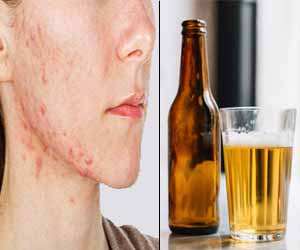- Home
- Editorial
- News
- Practice Guidelines
- Anesthesiology Guidelines
- Cancer Guidelines
- Cardiac Sciences Guidelines
- Critical Care Guidelines
- Dentistry Guidelines
- Dermatology Guidelines
- Diabetes and Endo Guidelines
- Diagnostics Guidelines
- ENT Guidelines
- Featured Practice Guidelines
- Gastroenterology Guidelines
- Geriatrics Guidelines
- Medicine Guidelines
- Nephrology Guidelines
- Neurosciences Guidelines
- Obs and Gynae Guidelines
- Ophthalmology Guidelines
- Orthopaedics Guidelines
- Paediatrics Guidelines
- Psychiatry Guidelines
- Pulmonology Guidelines
- Radiology Guidelines
- Surgery Guidelines
- Urology Guidelines
Brimonidine gel effective in controlling alcohol flushing among Asians

USA: Brimonidine gel is effective in reducing the facial erythema in patients with alcohol flushing syndrome (AFS, also known as Asian glow and Asian flush), finds a recent study published in the journal JAMA Dermatology. This treatment may be beneficial for patients suffering from psychosocial distress due to AFS.
Alcohol flushing syndrome is a condition in which a person develops flushes or blotches associated with erythema on the face, shoulders, neck and in some cases the entire body after the consumption of alcohol. It occurs due to the deficiency of aldehyde dehydrogenase 2, as a result of which acetaldehyde accumulates causing the reaction. Acetaldehyde, a metabolic byproduct of the catabolic metabolism of alcohol. It affects 20% to 47% of East Asians and causes significant psychosocial distress. There are no approved treatments for this condition.
Wesley Y. Yu, Department of Dermatology, University of California, San Francisco, and colleagues determined whether brimonidine gel, 0.33%, decreases facial erythema in patients with AFS after consumption of alcohol in this randomized clinical trial.
For the purpose, the researchers recruited 20 healthy volunteers of East Asian descent with a self-reported history of AFS between April 2018 and March 2019. The mean (SD) age of the 20 individuals enrolled in the study was 30.5 (8.4) years, and there were 10 women (50%). The participants were randomized to the application of brimonidine gel to either the left or right half of their face. Placebo control was applied to the opposite side. After 30 minutes, participants ingested alcohol.
Outcomes were specified before data collection. The difference in erythema between the treated and placebo side of each participant’s face was measured 60 minutes after drug application (primary outcome) and at 90 and 120 minutes after drug application (secondary outcomes). Participants were asked to rate their likelihood of using the medication again and their likelihood of recommending the medication to a friend on a scale of 0 to 10.
Key findings of the study include
- There was a significant difference in erythema at 60 minutes after drug application as measured by the difference in Clinician Erythema Assessment score (2.1) and by the difference in Subject Self-Assessment score (1.7).
- This effect persisted at 90 and 120 minutes. Individuals were likely to use the medication again (7.2) and would also recommend it to a friend (7.6).
"This study demonstrates that brimonidine gel is effective in reducing the facial erythema of AFS. Patients with psychosocial distress due to AFS may benefit from treatment with brimonidine," concluded the authors.
The study, "Effect of Topical Brimonidine on Alcohol-Induced Flushing in Asian Individuals: A Randomized Clinical Trial," is published in the journal JAMA Dermatology.

Disclaimer: This site is primarily intended for healthcare professionals. Any content/information on this website does not replace the advice of medical and/or health professionals and should not be construed as medical/diagnostic advice/endorsement or prescription. Use of this site is subject to our terms of use, privacy policy, advertisement policy. © 2020 Minerva Medical Treatment Pvt Ltd